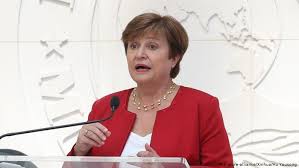The International Monetary Fund (IMF) has announced a new $41 billion under its Resilience and Sustainability Trust (RST) to support developing countries in their current drives towards mitigating climate threats through green projects.
The IMF Managing Director, Kristalina Georgieva, made this disclosure during one of her presentations at the New Global Financial Pact Summit in Paris, France, which closed on Friday.
According to her, the SRT, which is a funding tool that enables developing countries to fund green projects, had exceeded its $35 billion funding goal but $41 billion now remained available, and much of that money came from the reallocation of SDRs by rich countries, led by France.
Georgieva disclosed plans by the multilateral finance institution to grow the trust to $60 billion.
She said: “We have created a new instrument: the Resilience and Sustainability Trust. It lends for the first time in the history of the IMF long-term affordable financing with a 20-year repayment period and a 10-and-a-half-year grace period.
“How did we fund it? We funded it with the goodwill of countries like France – and we look forward to the U.S. contributing – that have taken part in their new SDR allocation and, per the promise made, they have made this available to the IMF to enable us to provide this long-term, affordable lending.
“We have reached the commitment pledged in 2021 –the pledge of $100 billion in SDR channelling. Around $60 billion of this pledge is already working at the IMF in the Poverty Reduction and Growth Trust and the Resilience and Sustainability Trust.
“We have seven countries that have benefited, and we have 40 countries expressing interest. And because of that, I want to announce today we are lifting our ambition to increase by 50% the size of the Resilience and Sustainability Trust, so we can respond to needs”, Georgieva added.
She expressed optimism that the RST would play a crucial role in accelerating the green transition in developing countries and enabling them to more effectively address their energy transition challenges.
The development finance expert pointed out that over the years, the IMF had integrated climate considerations into everything it does because climate is macro-critical.
Earlier, some rich countries at an earlier meeting during the Summit committed to secure $100 billion in so-called Special Drawing Rights (SDRs) to all IMF members in amounts that are tied to the size of their economies, even as some of them had reallocated a part of their own SDRs to benefit countries with greater needs for emergency funding.
Based on the terms of the facility, developing countries can access the funds through the IMF in emergencies and the RST does not add to the debt profiles of the countries.






